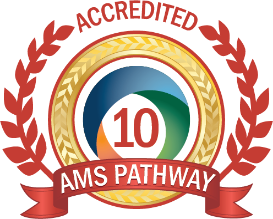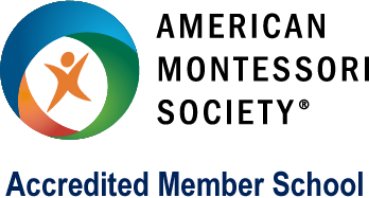What is Montessori Education?
Montessori education is a child-centered educational philosophy based on the work of Italian physician and educator, Dr. Maria Montessori. Through her extensive scientific research and work during her lifetime “The Montessori Method” was born and has spread throughout the world for over the past 100 years.
The basic tenets of Montessori philosophy are based on the belief that every child is a gift with an intrinsic love of learning and unique interests. Each lesson or activity in a Montessori classroom has concrete materials associated with it. An AMS certified Montessori guide delivers direct and indirect lessons, intentionally observing the children in her care, and plans lessons and activities according to her observations.
Our mixed-age classrooms are designed according to child developmental stages called planes. They have attractive and engaging materials intended for the ages of the children present. The five principal areas of a primary classroom are: practical life, sensorial, math, language, and cultural areas. The cultural area encompasses geography, history, botany, zoology, science, and art. Children are encouraged to choose their interested activities freely, exploring the classroom with age-appropriate independence when not receiving a direct lesson from a teacher.
The multi-age groupings for the Toddler classroom are sixteen months to three-year-olds; the Primary classroom, three- to six-year-olds; the Lower Elementary classroom, six- to nine-year-olds; and the Upper Elementary program with nine- to twelve-year-olds.
Montessori teachers are interested in partnering with parents to develop each child’s fullest potential and support their physical, social-emotional, and mental-educational growth. They give individualized lessons based on each child’s educational goals, the Montessori curriculum, and the needs of the child. Montessori education respects all cultures and religions and celebrates our diverse community with many heartfelt events inside and outside of our schools. We believe Montessori education lays a solid foundation for higher education and a lifetime of learning.
FAQ:
What is Montessori and how did it begin?
Montessori is an approach to education with the fundamental belief that a child learns best within a social environment which supports and respects each individual’s unique development. Dr. Maria Montessori, the creator of the “The Montessori Method of Education”, based this approach on her scientific observations of young children’s behavior. She was one of the first female physicians to graduate from the University of Rome. She opened her first school based on her observations that young children learn best in a homelike setting, filled with developmentally appropriate materials that provide experiences contributing to the growth of self-motivated, independent learners. She carried her message throughout the world, including the United States, as early as 1912.
Are all Montessori Schools alike?
Montessori is not a franchise, although there are chains that claim to be Montessori schools. It is important to choose a school that has Montessori teacher credentials MACTE-accredited programs. These programs are well respected and are recognized by the American Montessori Society. Schools that are accredited by the American Montessori Society must meet certain criteria and a school search can be found at amshaq.org.
How can a ‘real’ Montessori school be identified?
Since Montessori is not a franchise and is a word in the public domain, it is possible for any individual or institution to claim to be Montessori. An authentic Montessori school must have these basic characteristics at all levels:
- Teachers credentialed from a MACTE accredited Montessori Program.
- Authentic Montessori does not mix with other philosophies.
- Classrooms must have multi-aged (3 year) groupings. Kindergarten is not a separate program, rather the most important year of the 3 year cycle in the Primary Program.
- A diverse set of Montessori materials, activities and experiences designed to foster physical, intellectual, creative and social independence.
- A schedule which allows large blocks of time to problem-solve, to see connections in knowledge and to create new ideas.
- A classroom atmosphere which encourages social interaction for cooperative learning, peer teaching and emotional development.
How will my child transition out of Montessori into another type of school?
All children handle transitions differently. We are committed to supporting your child’s needs as they normalize into or out of a program. Our children graduate to other private or public schools with great success. Montessori children possess great communication skills, and confidence that they bring with them wherever they go.
What is the benefit of a multi-age classroom?
The multi-year (3 yr) span in each class is a very important part of the Montessori philosophy. Experienced children share what they have learned while reinforcing their own learning and leadership skills. Younger children learn from their older peers by observation.
Are your teachers certified?
As a fully AMS accredited elementary school, our teachers meet all the criteria of the highest standards of a Montessori program. Please find out accreditation status at amshaq.org

